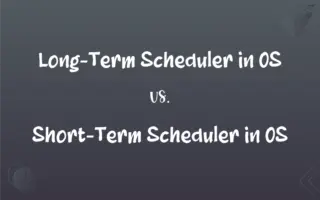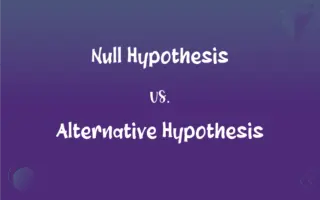Young People vs. Old People: What's the Difference?
Edited by Aimie Carlson || By Harlon Moss || Published on February 11, 2024
Young people are typically in the early stages of life, characterized by growth and learning, while old people are in later stages, often marked by experience and wisdom.

Key Differences
Young people are generally in the phase of life where physical growth and development are most rapid. They are often adapting to and learning about the world around them. Old people, conversely, have completed their physical growth and are characterized by the accumulation of life experiences and knowledge.
In terms of lifestyle, young people tend to be more adaptable and open to change, often embracing new technologies and ideas. Old people, having lived through more, might prefer stability and the familiarity of established routines and practices.
Psychologically, young people are typically in the process of forming their identities, exploring various aspects of self and society. Old people usually have a more established sense of self, grounded in their long-term personal and social experiences.
Socially, young people are often more engaged in establishing their careers, relationships, and place in society. Old people, in many cases, have established these aspects of their lives and may focus more on retirement, family, and legacy.
Health-wise, young people usually have more physical resilience and capacity for recovery, while old people may face more health challenges and require greater medical attention.
ADVERTISEMENT
Comparison Chart
Physical Stage
Growth and development
Experienced and often beyond physical growth
Lifestyle
Adaptable, open to change
Prefer stability, established routines
Psychological
Forming identity, exploring
Established sense of self, reflective
Social Engagement
Establishing careers, relationships
Focused on family, legacy, retirement
Health
Generally robust, resilient
May face more health challenges
ADVERTISEMENT
Young People and Old People Definitions
Young People
Often engaged in learning and acquiring new skills.
Young people are usually active learners.
Old People
Individuals in the later stages of life, often retired.
Old people frequently share valuable life lessons.
Young People
Those experiencing rapid physical and mental growth.
Sports are popular among young people for physical fitness.
Old People
May require more healthcare and support.
Healthcare services are crucial for the wellbeing of old people.
Young People
Individuals forming their identities and life paths.
Many young people are exploring different career options.
Old People
Characterized by a wealth of experience and knowledge.
Old people often have interesting stories from the past.
Young People
Individuals in the early stages of life.
Young people often attend school or university.
Old People
Often focused on family, legacy, and reflection.
Old people enjoy spending time with their grandchildren.
Young People
Typically more adaptable to technological changes.
Young people quickly adapt to the latest gadgets.
Old People
Typically have established personal and social identities.
Old people usually have a clear sense of who they are.
FAQs
How are young people’s social engagements typically characterized?
Young people are often engaged in establishing their careers, relationships, and social status.
What are the typical psychological traits of young people?
Young people are often in the process of forming their identity and exploring different aspects of life.
Are young people generally healthier than old people?
Young people tend to have more physical resilience and fewer health issues compared to old people.
Is adaptability to change a trait of young people?
Yes, young people are often more adaptable and open to change, including embracing new technologies.
What characterizes the physical state of young people?
Young people are typically in a state of growth and physical development.
Are old people generally less adaptable to technological changes?
Old people might be less adaptable to new technologies compared to younger generations.
Do old people usually have more established identities?
Yes, old people often have a more established sense of self, based on their life experiences.
Do old people face more health challenges?
Yes, old people often face more health challenges and may require greater medical attention.
Do young people often have flexible lifestyles?
Yes, young people often have more flexible and changeable lifestyles.
What is a common focus for old people in terms of social engagement?
Old people often focus on family, legacy, and enjoying their retirement.
Can young people easily adapt to new social norms?
Generally, young people can more easily adapt to and embrace new social norms.
Are old people typically less involved in learning new skills?
Old people may be less focused on acquiring new skills compared to younger individuals.
Do old people often share wisdom from their experiences?
Yes, old people frequently share wisdom and knowledge gained from their life experiences.
Is physical fitness more associated with young people?
Physical fitness and active lifestyles are typically more associated with young people.
Are young people more involved in education?
Young people are generally more actively involved in formal education and learning.
Are young people’s careers usually in the development stage?
Young people are often in the process of building and developing their careers.
How do old people view their careers?
Old people often reflect on their careers, focusing more on retirement and past achievements.
Do old people often engage in community and family activities?
Yes, old people frequently engage in community activities and spend time with family.
How do old people contribute to society?
Old people contribute to society through sharing their experiences, wisdom, and mentorship.
Are old people’s lifestyles usually more stable?
Old people often prefer stability and familiar routines in their lifestyles.
About Author
Written by
Harlon MossHarlon is a seasoned quality moderator and accomplished content writer for Difference Wiki. An alumnus of the prestigious University of California, he earned his degree in Computer Science. Leveraging his academic background, Harlon brings a meticulous and informed perspective to his work, ensuring content accuracy and excellence.
Edited by
Aimie CarlsonAimie Carlson, holding a master's degree in English literature, is a fervent English language enthusiast. She lends her writing talents to Difference Wiki, a prominent website that specializes in comparisons, offering readers insightful analyses that both captivate and inform.







































































